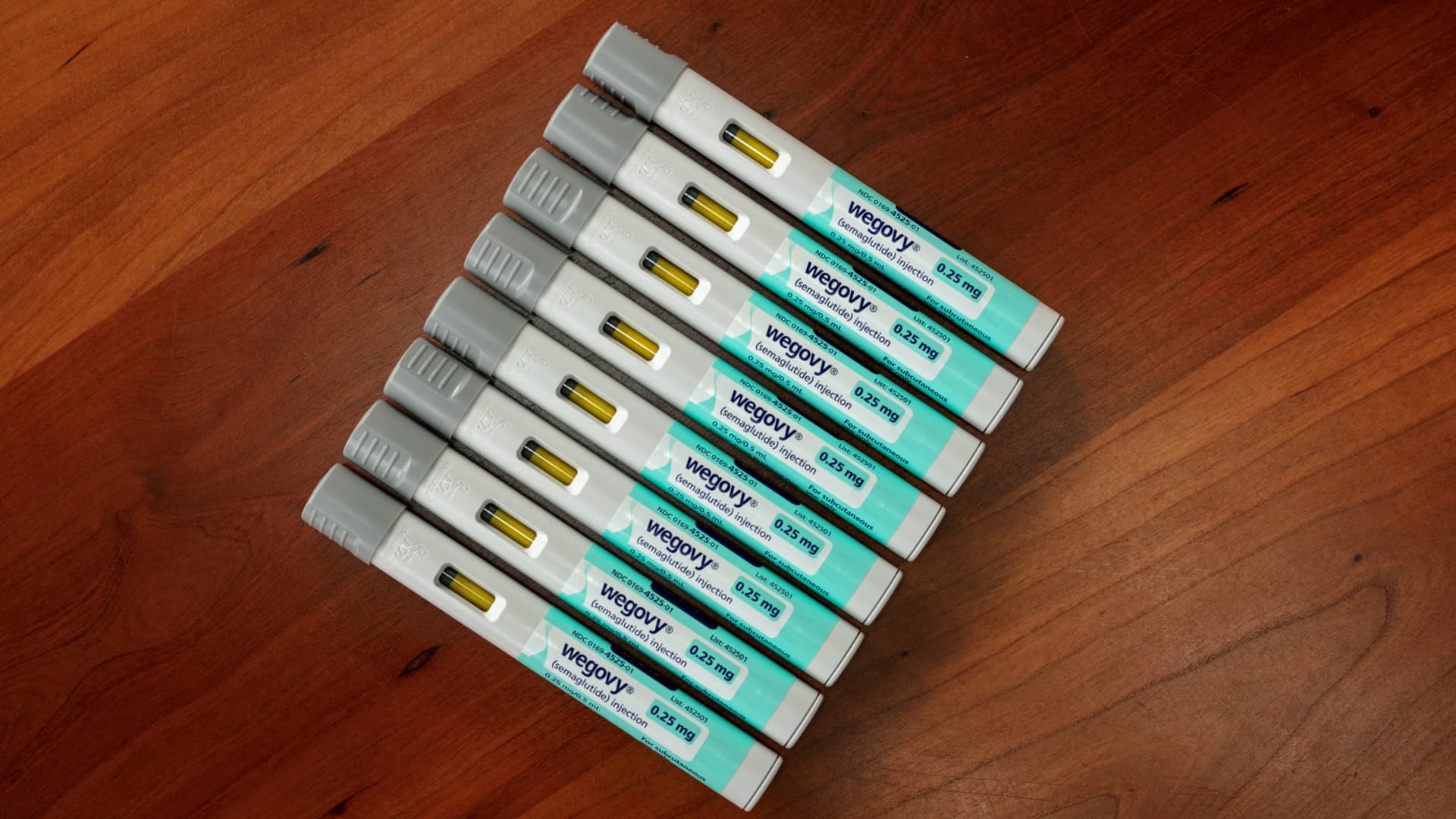A collection of injector pens for Saxenda, a weight loss drug, is featured in a photo illustration in Chicago, Illinois, US, on March 31, 2023. A recent clinical trial has shown that Novo Nordisk’s obesity drug Wegovy can reduce the risk of serious heart problems by 20%, which is a significant finding that could increase pressure on insurers to cover this popular medication and other weight loss treatments. As a result, weight loss-related stocks, such as Novo Nordisk and Eli Lilly, saw a surge in share prices of more than 15%. Weight Watchers International, the owner of a telemedicine firm that prescribes obesity drugs, experienced a jump of up to 24% in its share price. However, this data is just the beginning, and the US still has a long way to go before there is widespread insurance coverage for obesity drugs.
While the trial results indicate that obesity drugs offer significant health benefits beyond weight loss, organizations representing US insurers have highlighted that the data is still preliminary. Concerns about the high costs of covering these medications, which amount to nearly $1,350 per month for a single patient, are also raised. David Allen, a spokesperson for America’s Health Insurance Plans, a trade association of health insurance companies, emphasized the need for further evaluation of the efficacy and long-term effectiveness of prescription drugs. Meanwhile, Ceci Connolly, CEO of the Alliance of Community Health Plans, acknowledged the potential of the data but criticized the exorbitant prices of these drugs.
Wegovy and Novo Nordisk’s diabetes drug Ozempic have become increasingly popular in the US for their ability to facilitate significant weight loss over time. These treatments fall under the category of GLP-1s, mimicking a gut hormone that suppresses appetite. Eli Lilly and Pfizer are also developing their own GLP-1s to capitalize on the lucrative weight loss drug market, which analysts believe could be worth up to $200 billion by 2030. However, insurance coverage for these drugs is inconsistent, with Medicare, some Medicaid programs, and certain commercial plans excluding coverage. While some major insurers, including CVS Health’s Aetna, do cover these treatments, more insurers are reducing coverage, as shown by a survey indicating a 50% decline in coverage for GLP-1 drugs since December 2022.
Novo Nordisk’s recent data challenges the perception that obesity drugs are merely cosmetic and not medically beneficial. The study, which followed over 17,600 adults with cardiovascular disease who were overweight or obese, demonstrated a 20% reduction in cardiovascular events with the use of Wegovy. This finding aligns with the observed health improvements in individuals who undergo bariatric surgery. However, the high cost of these treatments, exceeding $1,000 per patient per month, poses a significant barrier to widespread coverage. The University of Texas System, for example, decided to significantly reduce coverage for obesity drugs due to the escalating costs. Additionally, the chronic nature of obesity necessitates continuous treatment with these drugs to sustain weight loss and other health benefits, further straining insurers’ budgets.
To overcome these challenges, market competition and the introduction of new drugs could potentially drive down prices. Eli Lilly’s Mounjaro, a diabetes drug that may receive approval for weight management in the near future, is expected to offer similar cardiovascular benefits to Wegovy. Nevertheless, the affordability of these medications remains a pressing issue, particularly in the public sector. The cost of providing Wegovy to just 10% of Medicare beneficiaries alone would amount to $27 billion per year. Currently, Medicare Part D plans do not cover weight loss drugs, although they do cover obesity screening, counseling, and surgery. Legislation has been introduced to remove this provision, but its fate in Congress is uncertain.
Furthermore, insurers may require additional data on the heart health benefits of obesity drugs before expanding coverage. Experts suggest that more studies similar to the recent one on Wegovy are needed to demonstrate the effectiveness of the entire class of drugs. Eli Lilly is currently conducting its own research on the cardiovascular benefits of Mounjaro, but the release date of the data is unknown. Despite this, experts and analysts anticipate that Mounjaro could offer comparable or even superior cardiovascular benefits to Wegovy, as it has been shown to cause a higher reduction in weight.
Denial of responsibility! VigourTimes is an automatic aggregator of Global media. In each content, the hyperlink to the primary source is specified. All trademarks belong to their rightful owners, and all materials to their authors. For any complaint, please reach us at – [email protected]. We will take necessary action within 24 hours.


